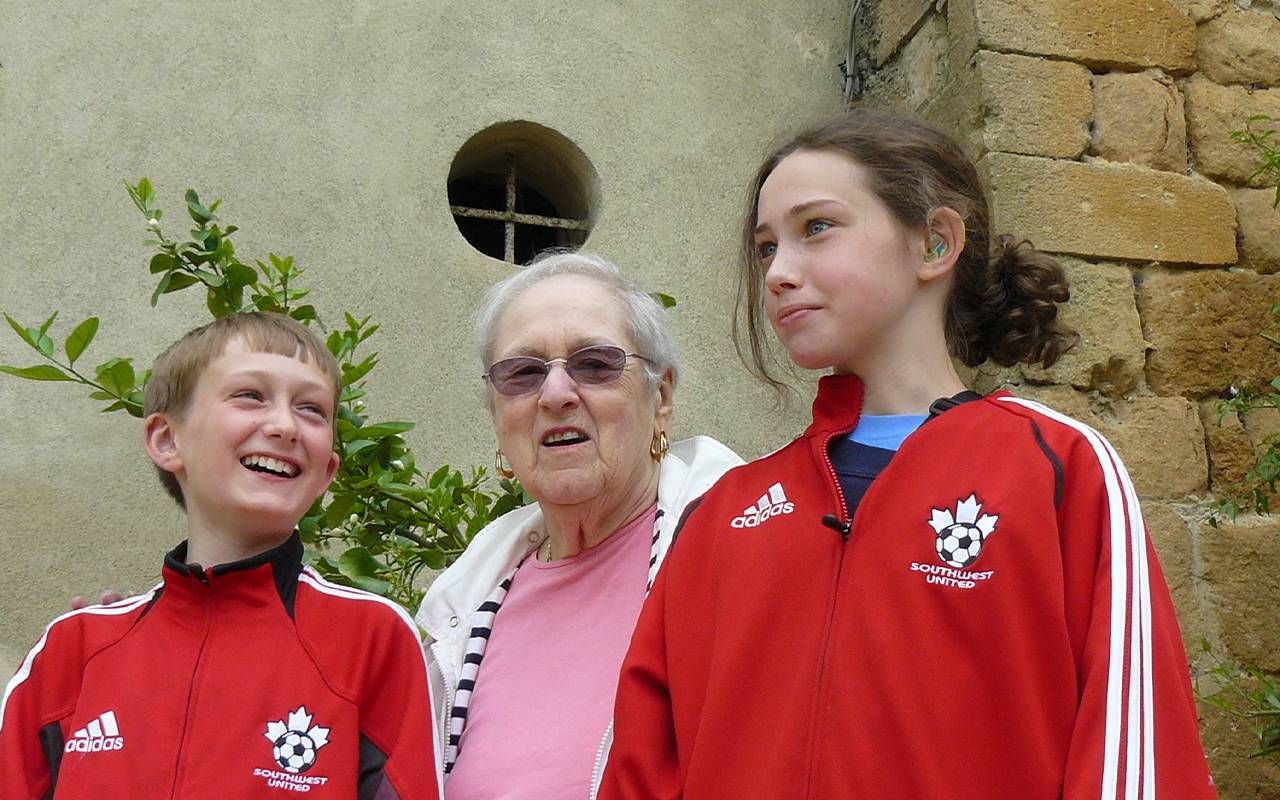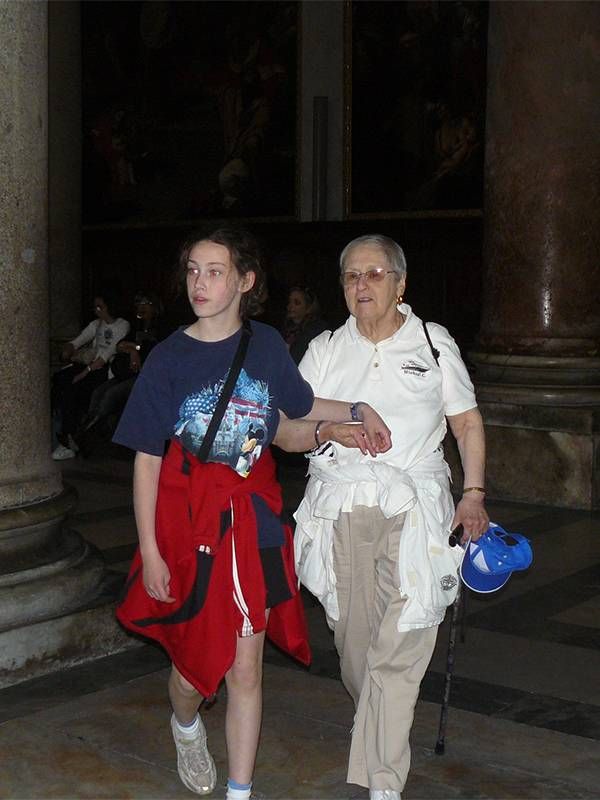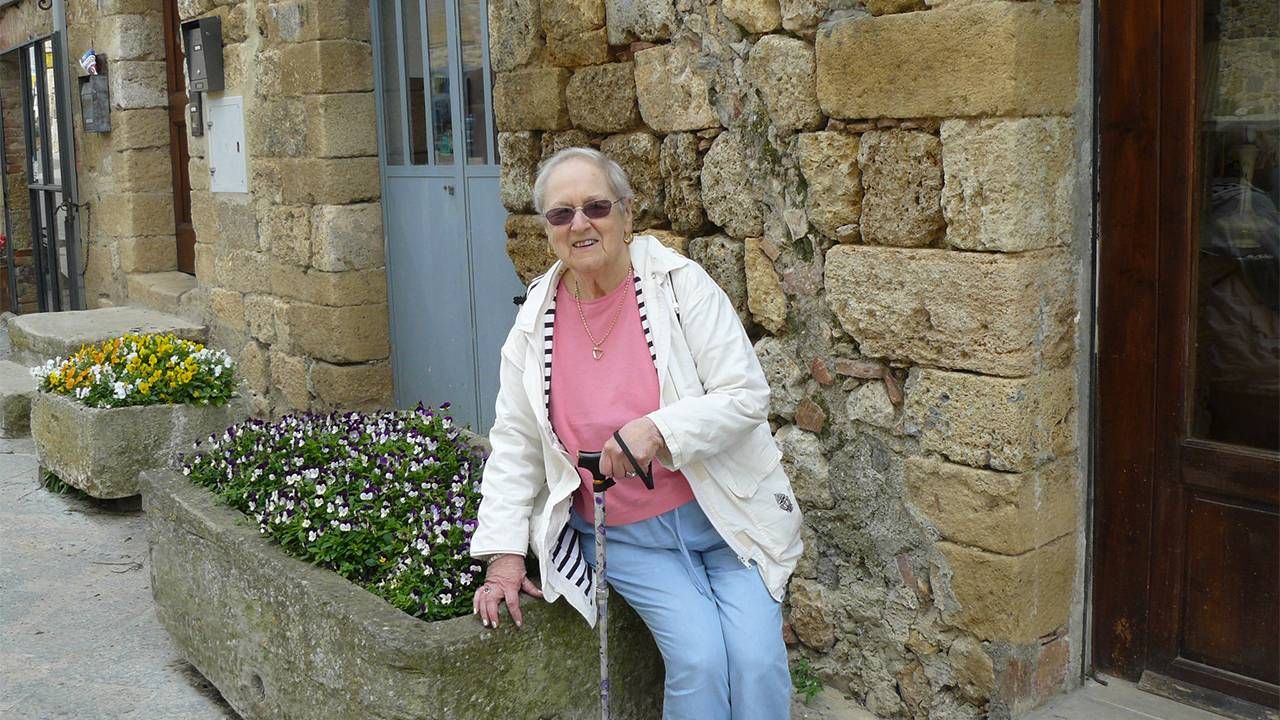I Took My Mother to Italy. Nobody Is Making a Movie About Our Trip.
Realizing my mother wasn't invincible was a reality check, but her grace in adapting to her limitations was a valuable lesson for me
I had been in Italy for a few hours when I had my first epiphany about the wisdom of inviting my 80-year-old mother on the trip. We had just arrived at the medieval estate in Tuscany where we were staying for five nights.
Mom, who preferred to joke rather than mope about her spinal stenosis, Parkinson's disease and rheumatoid arthritis, took one look at the long marble staircase leading to our apartment and wisecracked, "I guess I won't be going out often."

Fortunato and Gisele, our hosts, took one look at Mom and moved us to an apartment with one-quarter the stairs and twice the square footage. They charged us the same as for the smaller apartment. "Better for Mama," they said. "And she such a nice Mama."
Widowed for 24 years, Mom didn't have a lot of opportunities or money to travel.
What they didn't say, but were probably thinking, was, And she such an old Mama. Why you drag her on such a long trip?
I didn't drag her, I reminded myself. She wanted to come.
Actually, she'd wanted to come a decade earlier, when she was a sprightly, energetic 71-year-old. That was the first time my husband had been invited to a conference in Italy. He wanted me and our kids to join him.
"They don't even sleep through the night in this time zone," I reminded him. "I'm not paying to take a three-year-old and a one-year-old eight time zones away so they can not sleep somewhere else."
"I'll come," my mother offered. "I'll help. I'd love to go to Italy."
Her enthusiasm didn't surprise me. Widowed for 24 years, Mom didn't have a lot of opportunities or money to travel.
"We'll go when the kids are older," I promised.
Two years later, Dave was invited back to Italy. "How about it?" he asked.
"Five and three are not what I meant by older," I said. "They have to be sleeping through the night. They have to be able to walk more than three blocks without collapsing. And they have to be able to appreciate what we're seeing."
"I might not be able to do everything," she'd said in one of our many phone conversations leading up to the trip.
The next time Dave was invited, Elizabeth was 12 and Noah 10. We didn't need a baby-sitter. We invited Mom because she lived 2600 miles away and we didn't see her often. A trip to Italy seemed an ideal opportunity for bonding, not to mention an ideal gift for her milestone birthday.
What hadn't occurred to me was that by the time our children were old enough to meet my requirements, Mom would be the wrong age for most of them. To be fair, she warned me: "I might not be able to do everything," she'd said in one of our many phone conversations leading up to the trip.
'I'm Sorry, I'm Slowing You Down'
It was easy for me to dismiss her concerns because she'd said the same thing six years earlier, when we'd taken her on a road trip to western Canada and Alaska. The only time she didn't join us was when we explored a deep ravine in northern British Columbia. She parked herself on a bench and read. Everything else she could do, including hiking 50 yards to an outhouse in the Yukon in the middle of the night when I (oops) booked us into a cabin without indoor plumbing.
Our northern road trip took place before Mom was diagnosed with the Parkinson's and spinal stenosis. In Italy, "I might not be able to do everything" meant she couldn't walk a city block without stopping.

An art lover, she missed the Sistine Chapel because by the time we located a wheelchair after hours exploring Vatican Museum on foot, the chapel was closing.
While my husband and kids and I climbed to the top of the Leaning Tower of Pisa, she sat on the steps of the neighboring cathedral and read.
Despite researching the Jewish Quarter in Rome for months, she barely saw any of it — she was so wiped out after riding the open-air sightseeing bus that she took a cab back to the hotel and didn't get out of bed until the next day.
"I'm sorry, I'm slowing you down," she apologized, repeatedly. The apologies made me feel worse than the fact that she was slowing us down.
My daughter wasn't always subtle about expressing her frustration. I understood, but I had little sympathy. She would have plenty more opportunities to travel. I, on the other hand, would never return to the happy state of denial where I'd lived before our family trip to Italy.
For decades I'd thought of Mom as invincible. Part of this was a survival mechanism. After my dad died when I was 13, I couldn't bear the thought of losing another parent so I convinced myself she was invincible. In Italy, I came face to face with her mortality.
"You've got to get your mother a folding stool," insisted our friend Miles, who traveled with us for a week. We carried that stool everywhere. We would drive our rented car to whatever site we were visiting, drop her off, park and hike back to meet her. We'd tour together in the morning, when she was at her best, then leave her to rest in the afternoon while we went exploring.
I thought about how she'd handled the last week and a half, gracefully doing what she could while making a genuine effort not to put a damper on everyone else's holiday.
Mom's need for frequent rest stops meant that we spent more time than we otherwise would have in the small, picturesque towns of Pienza and Monteriggioni. The former is the birthplace of Pope Pius II, who hired an architect to redesign his home town in 1459, resulting in the Renaissance's first planned community. What I found most attractive about the layout was that the town was flat.
Monteriggioni, too, is flat, but it's a hilltop town. Even from the parking lot you have to hike up an incline. Mom spent most of her time in that medieval walled city on a bench, recovering from the walk and writing in her journal while Elizabeth and Noah visited the local museum. They came back and showed her their pictures, the 2008 version of the COVID-era virtual tour.
Lessons from My Mother
The accommodations helped, but for me, they were bittersweet. I'd expected our trip to Italy to be a nonstop, joyful, multi-generational holiday. Instead, I got a harsh reality check: forbearance and a can-do attitude are no match for the slow creep of frailty that is a hallmark of old age.
Mom died five years ago, a week after her 90th birthday. I've been thinking about our trip because my husband and I recently traveled to Italy, and when I was checking air fares back in January I was bombarded with ads for "80 for Brady," a comedy featuring Jane Fonda, Lily Tomlin, Rita Moreno, and Sally Field (combined age: 335) as football fans with the energy level of puppies and the libidos of teenage boys.

I hope I'm that active when I'm in my 80s. But if not, I'll draw on the lessons I learned from Mom.
"This is the last time I'm going to be able to take a trip like this," she informed me in a matter-of-fact voice as our double-decker sightseeing bus passed the Coliseum in Rome. "My traveling days are over."
My initial impulse was to challenge her. "What's with the quitter attitude, Mom?" I almost said.
But then I thought about how she'd handled the last week and a half, gracefully doing what she could while making a genuine effort not to put a damper on everyone else's holiday. And I realized that she wasn't quitting, she was accepting her new reality — and showing me how to do the same.


